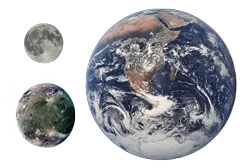Paradigm Shifts in Scientific Thinking
Many ideas are expressed across many scientific disciplines that began being published in 2011; this new thinking began for the author in the late 1980s as new data from space exploration, seabed and ice-core drillings, and new techniques for measuring age began to pour in. I have great respect for the academic professions and only wish to gain their attention and acceptance in breaking down some cherished paradigms. I do not wish to challenge their current research journals, books, and public presentations. I only want to start a dialogue to change the direction of current research that can better explain what is being discovered.
Can I gain this cherished attention and acceptance in initiating the breaking down of established paradigms that are supported by governmental funding that does not wish to support so-called pseudoscience ventures? Such paradigms that I address are the means of planet formation, the beginnings of the Earth/Moon system, the delivery of liquid water to only planet Earth, the configured first mega-continent, and reasons for tectonic plates with their drifting continents.
My continued persistence will hopefully open a crack to produce new visions in the future. My lack of credentials and connections is a huge hindrance, but I have the passion to believe and pursue my deductive reasoning.
I have kept older articles on the website that show my evolution of thought over the years. Such notable paradigm shifts for me, which you can read about in my articles, are listed:
a) The formation of stars by Bennett pinches of double-layered currents coming from the center of the galaxy.
b) The synthesis of elements created by the hot corona of stars.
c) The expelling of elements from stars to balance charge, thereby forming planets.
d) The planets expel the prolific molecules of iron, C02, H20, NH3, and NOx to form moons.
e) The rotating of Earth's crust due to solar coronal mass ejections.
f) Changing from an orbiting rogue planet around the Sun to an orbiting brown dwarf.
One must always keep an open mind. I try.
